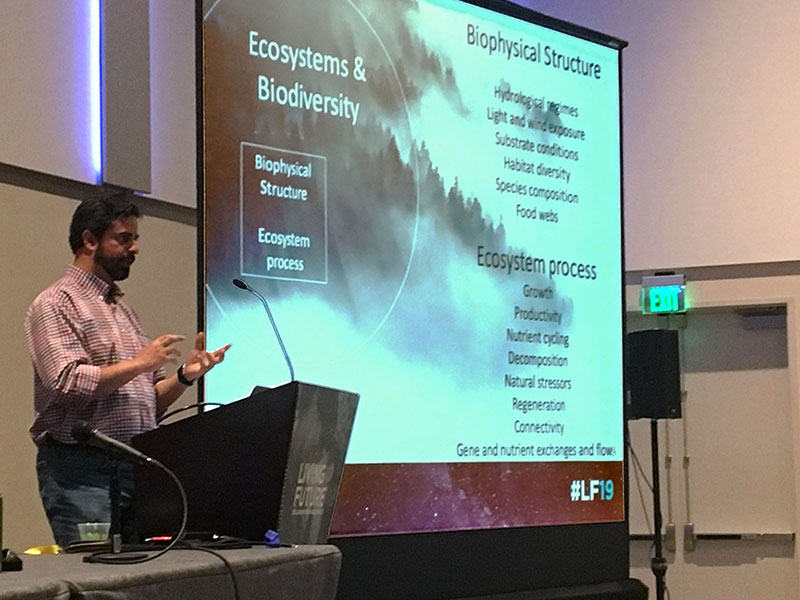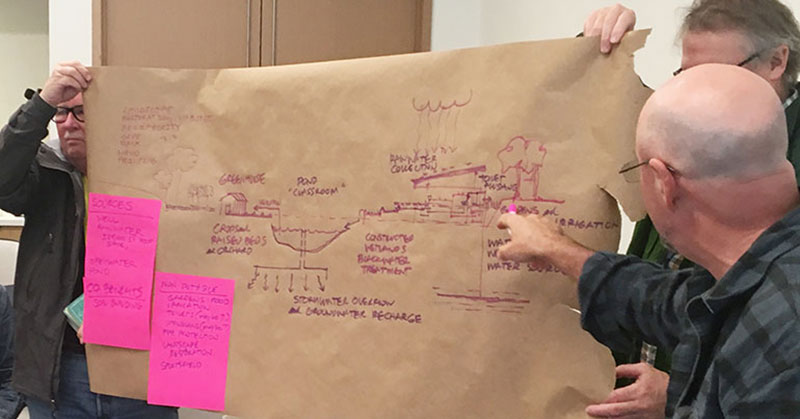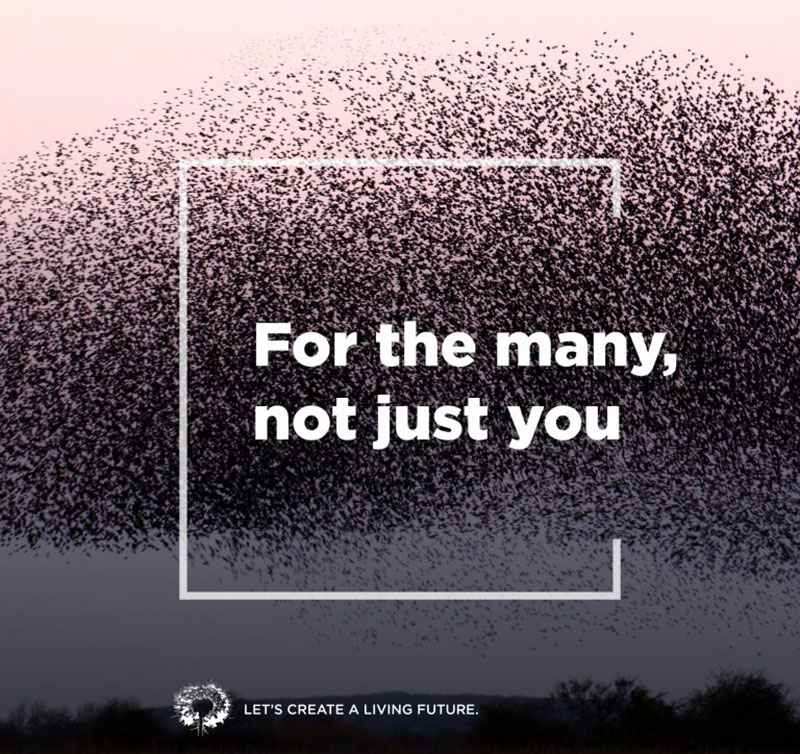What does good look like? To the International Living Future Institute (ILFI), the organization behind the Living Building Challenge, it looks like this: an ecologically restorative, socially just, and culturally rich civilization. The ILFI dares us to imagine a world where every single act and product involved in design and construction made life better–for everyone and every living thing. But they are not only promoting this bold vision, they are bringing it to life through a variety of programs and initiatives. In the process, they are providing tools, advocacy, and professional development that is redefining “performance” in the built environment.
The International Living Building Institute was created of and by Cascadia Green Building Council in 2009 to oversee the Living Building Challenge and its auxiliary programs. At the time, says Living Building Challenge founder and current ILFI Board Chair, Jason McLennan, “There wasn’t a non-profit that was doing this kind of education and framework setting in the industry.”
Today, in addition to overseeing the management, certification, promotion, and ongoing evolution of its flagship program, the Living Building Challenge (LBC), the ILFI administers two related visionary programs: the Living Product Challenge (LPC) and the Living Community Challenge (LCC). Like the LBC, these certification programs and standards are structured around the performance areas of: Place, Water, Energy, Health & Happiness, Materials, Equity, and Beauty.

Some of the many ILFI programs and initiatives
The LPC applies the robust concepts of the Living Building Challenge to manufactured goods. It challenges manufacturers to create healthy, sustainable products that are net positive across their lifecycle. Living Products are informed by biomimicry and biophilia, manufactured by processes powered only by renewable energy and within the water balance of the places they are made. ILFI’s “LP50,” a collaboration of early LPC adopters, includes some of the most influential manufacturers of building materials. Together, they are working to ensure that high performing, healthy, sustainable and affordable building materials become the rule, not the exception.
The Living Community Challenge (LCC) extends the reach of the LBC by applying its holistic philosophy and innovations to the scale of an entire community, city, or region. Developed to create a new model of community building and urban design, the LCC provides certification process for the vision plan, master plan, construction and evolution of a Living Community. As with the LBC, the LCC offers different levels of certification: Net Zero Energy, Petal, and Living. (For more about the LCC, see David Yocca’s article in this issue)
To help organizations publicly document, quantify, and share their commitment to the vision of a Living Future, the ILFI offers its JUST, Declare, and Reveal transparency labels.
Similar to a nutrition label on food packaging, the JUST label helps stakeholders understand the composition of a company or organization—its values, business model, policies and workplace culture. The program provides a transparent platform for organizations to voluntarily disclose initiatives in the categories of Diversity, Equity, Safety, Worker Benefit, Local Benefit, and Stewardship. To date, 104 organizations (including many that may be familiar to Leaf Litter readers) have earned the JUST label, and the list is growing.
Reveal aims to make commercial buildings’ energy use more transparent by labeling their electricity consumption. The immediate goal is transparency, and projects do not need to have renewable energy. There is no minimum or maximum threshold for energy efficiency for projects. Reveal labels boost buildings’ visibility and sustainability profiles.
Declare is an ingredients initiative for building products that is designed to shape a greener, healthier environment for construction workers, business employees, and customers alike. The Declare program labels goods with a full list of ingredients and expands the transparency of the building market. Labels for Declare products, which can be viewed on the ILFI website, include a full list of the product’s ingredients, details about its manufacturing and life expectancy, and information about what can be done with the product at the end of its life.
These labels do not just connect to the philosophy and intent of the LBC; they connect to its implementation. For example, LBC Imperative 12 requires project teams to include at least one Declare-labeled product per 500 square meters of their project’s gross building area and to advocate to a minimum of ten other manufacturers to join the program. Imperative 18 requires that that at least one core contributing firm on the project have a Just label. The Declare label (along with Living Product Challenge certified products) is also considered a compliant pathway in the LEED (version 4 and 4.1) Building Product Disclosure and Optimization-Material Ingredients credit.
The ILFI also advances its mission by providing opportunities for networking, idea exchanges, local collaboration, and professional development. In the spring, the organization hosts its annual unConference, a multi-industry gathering of people interested in regenerative design. Featuring world-renowned keynote speakers, educational sessions, summits, workshops, and tours, the unConference provides participants engage with leading-edge practitioners, learn from the inspiring projects, and become part of a community that is transforming the way we think about the built environment.

Biohabitats Sr.Ecologist & Integrated Design Specialist Juan Rovalo, sharing knowledge at the 2019 Living Future unConference
The Living Products Expo, held every fall, brings together leading minds in the design and manufacturing industries. The Expo offers the unique opportunity to learn about and access some of the most innovative products in the industry. This year’s Living Products Expo is right around the corner. It will take place in Nashville, Tennessee October 8-10 and will feature some of the leading minds in sustainability and product design.
For those who want to deepen their knowledge, demonstrate their commitment to the ILFI mission, and distinguish themselves as leaders in the regenerative design community, ILFI offers a Living Future Accreditation (LFA) program. Accreditation requires completion of a 20-credit Foundational Curriculum and 16 additional “general” LFA credits, which can be earned through ILFI events and online learning opportunities, as well as through independent study.
ILFI also has “Collaboratives,” which range from local to national, throughout the world. Collaboratives serve as a hub for people who are working on or interested in LBC and LCC projects. Collaboratives may provide educational resources, support, advocacy, and networking events.

Collaboration at an ILFI event
In addition to its educational and networking events, the IFLI helps promote and share success stories, case studies, and new technologies through its publishing arm, Ecotone Publishing, and its Trim Tab blog.
All ILFI programs work together. “We kind of view our programs as parts of an ecosystem,” said Kathleen Smith, Vice President of the Living Building Challenge. “No matter where you’re coming in, there is a place, an approach, and a framework for you, and it’s really all connected.”
If an ecologically-restorative, socially just, and culturally rich world is your idea of what good looks like, you may want to become a member of the ILFI.
This year marks a decade since the ILFI’s founding in 2009. “I hope that the organization continues to scale and thrive,” said McLennan, “and the templates of the future we’ve been building and testing become part of the overall process of changing the trajectory of humanity and the planet.”


